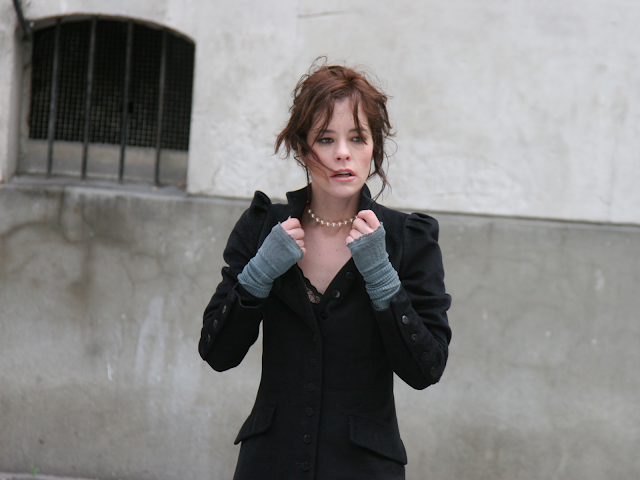 |
| Aubrey Plaza in Ned Rifle |
Cast: Liam Aiken, Aubrey Plaza, Parker Posey, James Urbaniak, Thomas Jay Ryan, Martin Donovan, Karen Sillas, Robert John Burke. Melissa Bithorn, Gia Crovatin, Bill Sage, Lloyd Kaufman. Screenplay: Hal Hartley. Cinematography: Vladimir Subotic. Production design: Richard Sylvarnes. Film editing: Kyle Gilman. Music: Hal Hartley.
And so ends the saga of Henry Fool that began in his eponymous film in 1997. Henry (Thomas Jay Ryan) is known as usual mainly through his effect on others, primarily the Grim family but also -- in Fay Grim (2006) -- the international espionage community. He has sent two of the Grims, Fay (Parker Posey) and Simon (James Urbaniak), to prison because of their association with him. And now a third, his son, Ned (Liam Aiken), who has taken the surname Rifle, bears a grudge because of what happened to his mother, Fay, and his uncle Simon. He has reached the age of 18, having gone to live with a devoutly Christian family -- the Rev. Daniel Gardner (Martin Gardner) and his wife, Alice (Karen Sillas) -- since his mother was sentenced to life in prison as a terrorist. (Yes, to understand that you have to watch Fay Grim.) For those who have watched his films, it seems like the gang of Hartley regulars is all here. But there's a newcomer: Aubrey Plaza, who plays Susan Weber, a young woman who seems to be obsessed with the Grims. She's a graduate student at Columbia who's helping Fay write her memoirs, and she did a thesis (which was rejected) on Simon's Nobel Prize-winning poetry. But what she really wants to do is track down Henry -- she has her reasons, which we will learn. Susan crosses paths with Ned when he goes to see his uncle, also trying to find Henry, whom he wants to kill, despite the earnest Christian faith that he has adopted. The rest is a working out of motifs drawn from previous Hartley films, and not just the first two in the trilogy. There's also an echo of Hartley's short film The Book of Life (1998) in which Donovan played Jesus and Ryan played the devil: In Ned Rifle Henry is under psychiatric care because he is pretending that he believes he's the devil. But I think Henry Fool is really a variation on Jay Gatsby, F. Scott Fitzgerald's self-made man who isn't what he seems and eventually meets his end because of the charismatic spell he casts on other people. Plaza is terrific and the rest of the cast is in great form.










